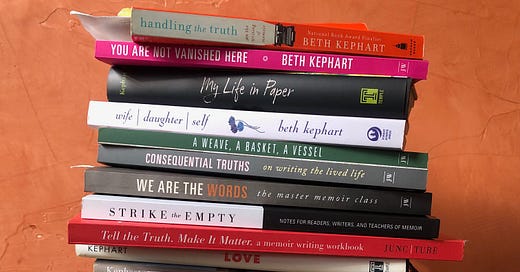Many years ago, so very many, I set out on a quest to understand the universal in memoir—what it is and why it matters. I taught the concept in my classrooms at the University of Pennsylvania. I tested it during weekend workshops. I wrote and rewrote my own small truths, published books on craft, gave lectures, raised the bar: What else? What more?
This year, I received a copy of a memoir how-to from one who noted, in her hand-written inscription to me, that my first craft book on memoir, Handling the Truth (2013), had been “her first teacher.” Separate notes, sent through LinkedIn, praised my pages as foundational to hers—a vast understatement, as I would soon discover. What was interesting though—perhaps I’ll use the word confounding—is the way my work was written of—with sarcasm and snark, with quotes snatched out of context, with my intent misconstrued, and with the assertion that my contribution on the universal in memoir (among other things) is thin, perhaps even (she didn’t use this word, but her tone, to my ear, shouts it) fraudulent. I didn’t quite know what to do with that, and so, after querying this author about why she’d write such a book then send it to me with a flourish—I needed my work to stand above yours, but do know that I still think you are amazing, was, in essence, her answer—I let the whole thing go.
Lately, however, I’ve been thinking about legacy, about the things we choose to commit our hours, minds, and hearts to, and how we might protect them. The book described above is gaining traction. Its reader are finding me on page 1, then 2, then elsewhere looking like a shell of a thinker, a person who has built a career on a raft of loosely-bound, even arrogant sticks. And so, today, I’d like to set the record straight, to share here where I have, after all these years, landed on the matter of the universal in memoir. It’s not a subject I pursued for riches or fame. It’s just something that has mattered to me, something I hope I have made matter to others.
While fabulous writers such as Claire Dederer have written that “it is the job of the literary memoirist simply to write down her experiences with as much art and truth as she can muster… We don’t require transcendent wisdom. A writer does not have to be a phoenix,” I have, to the consternation of some, kept pressing. I have asked whether chasing the universal while writing a singular life is the same thing as a self-help-book odyssey. I’ve wondered out loud whether seeking wisdom is necessarily on par with producing a manifesto, or a screed.
I have suggested that if a life is worth writing down, it should also carry some meaning—something beyond the important tale of this is what happened to me.
But what, I have been asked, do I mean by that word “meaning?”
I believe that meaning emerges in memoir when the writer presses pause on the anecdotes and scenes and wonders out loud, or establishes a theme, or hints at what has been learned or cannot be learned, or attempts to articulate one small aspect of the confounding human condition. When the writer says, to the reader, you are not alone.
Meaning happens, in memoir, when the writer transcends their I to declare a We, such as Casey Gerald does in There Will Be No Miracles Here: “I have come with urgent news,” he writes, “We must find another mountain, another world, to call our own.”
Meaning happens when another articulates the essential thing she has learned, so that we might learn it with her, as Marion Coutts does in The Iceberg: “What is grief?” She asks. “I tried to do all my grieving in advance so it might not hurt me later. I tried to burn it up in the firestorm of the initial shock, annihilate it in on pyre. Ash can be dealt with. Take note that this did not work.”
Meaning happens when we are called upon to look at the so-called obvious in a brand-new way, as Durga Chew-Bose exemplifies in “Too Much and Not the Mood,” “There’s might too in the incomplete. In feeling fractional. A failure to carry out is perhaps no failure at all, but rather a minced metric of splendor.”
Meaning happens, again and again, in a multitude of ways. Search for it in the pages you read. Become a “meaning” hunter. Then turn the quest toward your story-telling self, beginning, perhaps, with a few questions:
What is worth believing in? What are the contours of forgiveness? What does kindness teach, and how about cruelty? What is worth defending? How might the story you wish to tell become a conversation with another undertaken in a room of open doors and windows?





Beth, it is so very hard to know what is in the minds of others. It took me a long time to write this post, and a long time to decide if I should post it. But in the end, as I have noted elsewhere, I've lived this small life of seeking, trying to learn—and not in pursuit of memoir fame and fortune. it's my ideas that I have tried to bolster and share, and it felt right, after much consideration, not just to defend them but to share them. Thank you for being near all these years.
IMO no one stands above you when it comes to talking/thinking/explaining/breathing the art of memoir. Exhibit A: this piece.